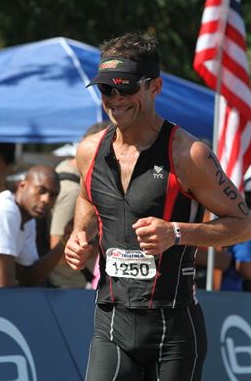Triathletes – Why get a coach?
 I hear a lot of good discussions about training for triathlon and how triathletes plan their training. I also hear an equal amount of talk about triathletes interested in receiving coaching. I think it’s great that triathletes are talking about planning their training to begin with. One of the biggest mistakes that many triathletes make, mostly those newer to the sport, is training without a plan. That is, they practice random training. This usually means the athlete does whatever the athlete feels like doing that day, as long as it is different from yesterday. Or worse, the athlete does whatever group workout is available on a given day. This type of approach is a sure-fire way for the athlete to plateau early on in the season and never reach their potential, until there is a big change in the way the athlete trains.
I hear a lot of good discussions about training for triathlon and how triathletes plan their training. I also hear an equal amount of talk about triathletes interested in receiving coaching. I think it’s great that triathletes are talking about planning their training to begin with. One of the biggest mistakes that many triathletes make, mostly those newer to the sport, is training without a plan. That is, they practice random training. This usually means the athlete does whatever the athlete feels like doing that day, as long as it is different from yesterday. Or worse, the athlete does whatever group workout is available on a given day. This type of approach is a sure-fire way for the athlete to plateau early on in the season and never reach their potential, until there is a big change in the way the athlete trains.
Yet, when I hear discussions about athletes seeking coaching, they are often highly tempered with ambiguity and doubt. Most athletes, even those with high goals and equally high motivation, don’t feel that coaching is right or necessary for them. Ironically, I frequently witness the same athletes willing to invest big dollars ($10-15K for a bike) into really nice, new, fast equipment (e.g. a time-trial bike, wetsuit, etc.). The underlying logic is no mystery: if I get fast equipment, I will eventually go faster on that equipment. I will “grow into it.” This logic is mistaken.
There is false assumption here. The assumption is that fast gear will produce faster race times. In fact, fast gear will only allow faster race times. So, I am saying that fast equipment will not make an athlete faster. What is limiting almost every athlete from advancing their abilities has very little to do with their gear. The only pieces of “equipment” that will make an athlete faster are their own body, and their mental skills required in racing triathlon. The flip side to this is that anybody can go faster using the gear they already have!
So, how do you make that equipment faster? By training better. Training better means training correctly, and training with a plan. “Correctly” in this context can’t be precisely defined, because training theories and techniques vary, and training is highly individualized. That is really a key point: knowing what works for you, and what does not, is not easy to discover. Just because your training buddy (or rival) is benefiting from one type of training does not mean that you will too. You may end up injured or burned out by following someone else’s plan (e.g. a pro-triathlete’s plan: You are not Lionel Sanders. Do not train like him.) Training is as much of an art as a science. So, the right training plan for you is essential for getting both of these aspects of training correct. Training with a plan is indispensable.
Even though many triathletes see making a seasonal training plan largely as an exercise in futility, it is as important as doing workouts right. If you don’t even know what workouts you need to be doing, chances are not very good for doing a workout right. One of my favorite quotes about the sport comes from former pro-triathlete and Ironman Champion, Scott Tinley who said, “Many dedicated endurance athletes don’t need to be told what to do – they need to be told what not to do.” One sure way to start to discover how to train correctly for yourself is with the objective, expert, and experienced guidance of a coach. Having a coach design a training plan for your season could be one of most important keys to your success.
So, do you need to be told what not to do?

